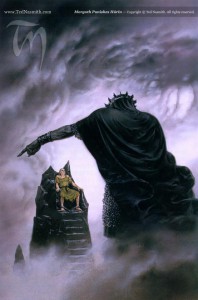
The Words of Húrin and Morgoth
It’s a key one, dominated by a long conversation between Húrin, and his captor, the Valar, Morgoth.
We’re likely to have many talking points but for me, the most pivotal is the Curse of Morgoth. Morgoth promises Húrin:
…upon all whom you love my thought shall weigh as a cloud of Doom, and it shall bring them down into darkness and despair. Wherever they go, evil shall arise. Whenever they speak, their words shall bring ill counsel. Whatsoever they do shall turn against them. They shall die without hope, cursing both life and death.
What exactly is the nature of the curse of such a being? What does it mean? How does it work?
It’s something Christopher Tolkien addresses fairly extensively in his forward to the novel.
The curse of such a being, who can claim that ‘the shadow of my purpose lies upon Arda [the Earth], and all that is in it bends slowly and surely to my will’, is unlike the curses or imprecations of beings of far less power.
We see that both the Doom of Mandos and the Oath of Fëanor have real and lingering effects on Middle-earth. In particular, the Oath of Fëanor in the Silmarillion is said to lie quiescent at several times before inevitably arising to wreak fresh havoc. The Doom of Mandos promises “unnumbered tears” and the Nirnaeth (see chapter 2) could almost be seen as the incarnation of that.
The Curse of Morgoth appears to function similarly. The effects are not instant, nor always perceptible. But Húrin’s family is marred, and inexorably fall into ruin.
Chris Tolkien goes on:
Morgoth is not ‘invoking’ evil or calamity on Húrin and his children, he is not ‘calling on’ a higher power to be the agent: for he, ‘Master of the fates of Arda’ as he named himself to Húrin, intends to bring about the ruin of his enemy by the force of his own gigantic will. Thus he ‘designs’ the future of those whom he hates…
Words such as “design”, presenting the Curse as an exercise of Morgoth’s will make me wonder — perhaps the Curse is irrevocably tied to how Morgoth eventually dispersed much of his power and will into Arda itself. His purpose, of course, was to corrupt and control it.
Is the curse on Húrin and his family in fact an example of Morgoth diffusing his will and self into Arda?
It’s an interesting thought.
Hall of Fire will be discussing this and a lot more later today as we begin our chapter-by-chapter discussion (we’re chatting about one chapter every two weeks). If you’d like to join us, just come to our chatroom through this link at 6pm ET!


